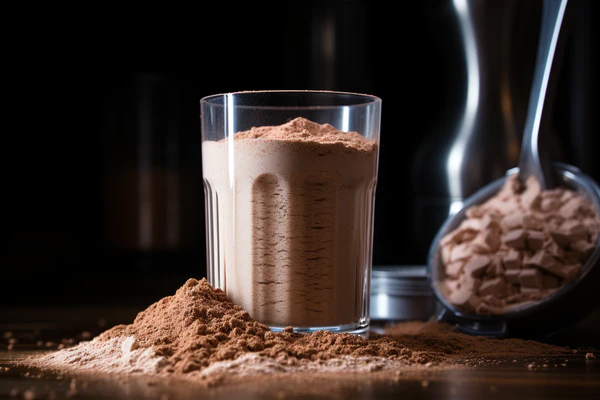Whey protein is a premium protein sourced from milk during cheese production. It’s the liquid portion that separates from curd, prized for its rich amino acid content and rapid digestion. This makes it a favorite in fitness and nutrition for muscle repair and growth. Its nutrient density extends its benefits beyond fitness, appealing to athletes and casual health enthusiasts alike.
Nutritional Profile of Whey Protein
Whey protein is highly efficient due to its excellent biological value (BV). A typical 30g serving includes:
- Protein: 20–25 grams
- Calories: 100–130
- Fat: 1–3 grams
- Carbohydrates: 2–5 grams
- BCAAs (Branched-Chain Amino Acids): ~5 grams
These components synergize to promote muscle development, enhance recovery, and sustain energy levels.
How Whey Protein Benefits Fitness
Muscle Growth and Recovery
Exercise induces microtears in muscles that need repair. Whey protein, rich in BCAAs like leucine, isoleucine, and valine, accelerates muscle recovery and growth. Consuming it post-workout ensures your body has the nutrients required for effective repair.
Weight Management and Fat Loss
Whey protein supports fat loss by promoting satiety, reducing hunger cravings, and increasing calorie burn due to its thermogenic effect. It’s an excellent tool for maintaining lean muscle during weight loss.
Improved Athletic Performance
Athletes use whey protein for its fast absorption, which ensures timely nutrient delivery to muscles. This improves endurance, strength, and recovery, making it essential for those in competitive sports.
Types of Whey Protein
- Whey Protein Concentrate:
Contains 70–80% protein with small amounts of fat and carbs. Ideal for beginners due to its balance and affordability. - Whey Protein Isolate:
With over 90% protein and minimal fat or carbs, isolate suits those focusing on calorie control or reducing lactose intake. - Whey Protein Hydrolysate:
Pre-digested for rapid absorption, it’s ideal for elite athletes or individuals with sensitive digestion.
Optimal Timing for Whey Protein
- Pre-Workout: Boosts endurance and reduces fatigue by supplying essential amino acids.
- Post-Workout: Fast absorption replenishes glycogen and supports muscle repair within the critical 30-minute recovery window.
- Meal Replacement: Combine whey protein with fruits, oats, or almond milk for a quick, nutritious option.
Benefits Beyond Fitness
- Boosting Immunity: Contains compounds like lactoferrin that enhance the immune system.
- Supporting Bone Health: Its calcium content strengthens bones and supports joint health.
- Improving Health Markers: Contributes to better cholesterol levels, blood pressure, and antioxidant support.
Who Should Use Whey Protein?
- Fitness Enthusiasts: Enhances recovery and performance for gym-goers and athletes.
- Athletes: Meets high protein demands for rigorous training.
- General Users: A convenient way to improve dietary protein intake and support overall health.
Choosing the Right Whey Protein
- Protein Content: Opt for isolate or hydrolysate for advanced goals; concentrate is great for general use.
- Additives: Choose products with minimal artificial ingredients.
- Budget: Balance cost and quality based on your fitness needs.
Precautions and Side Effects
- Digestive Issues: For those with lactose intolerance, choose isolate or hydrolysate.
- Allergic Reactions: Avoid whey if allergic to dairy and consider plant-based alternatives.
- Overconsumption Risks: Excessive protein can strain the kidneys, so stick to recommended dosages.
How to Use Whey Protein Creatively
- Smoothies & Shakes: Blend with fruits or nuts for a quick meal.
- Baking: Add to pancakes, muffins, or cookies for protein-packed treats.
- Savory Dishes: Use unflavored whey to enhance soups or sauces.
Conclusion
Whey protein is a versatile and effective supplement that supports fitness goals and overall health. Whether used for muscle growth, weight management, or recovery, it fits seamlessly into a balanced diet. Selecting the right type, timing intake, and incorporating it creatively can help you unlock its full potential.
FAQs
- Can anyone use whey protein?
Yes, except for those with milk allergies or severe lactose intolerance. - Is it effective for weight loss?
Absolutely! It enhances satiety, preserves lean muscle, and boosts metabolism. - How much should I consume?
Aim for 1.2–2.0 grams per kilogram of body weight, including dietary sources. - How does it compare to plant-based proteins?
Whey has a superior amino acid profile, while plant-based options may require combining for similar benefits. - Can lactose-intolerant individuals take whey?
Yes, isolate and hydrolysate are suitable low-lactose options. Always check labels and consult a professional.
